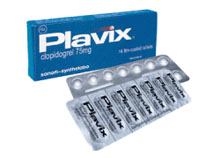Plavix is a prescription drug that keeps the blood platelets from clotting and thus avoiding unnecessary blood clots that can result to heart attack. It is given to patients who recently had a heart attack, stroke and coronary artery disease. It is also used to treat unpredictable and severe chest pains and blood clotting after a percutaneous coronary intervention.
In 2008, researchers from the McMaster University in Hamilton, Ontario, Canada discovered that patients with irregular heartbeats who took Plavix had 28% less risk of stroke. Plavix is orally administered. The tablets are round, pink and coated with film. It is available in two dosages- 75 mg and 300 mg. It should not be taken by people who have a history of bleeding or clotting disorder, stroke, and stomach ulcer and kidney disease. It is also not given to people who have active bleeding.
The drug was first approved by the FDA for treatment of acute coronary syndrome, unstable angina and mild heart attacks in 1997. Doctors later on prescribed it for myocardial infraction and stroke. It is sold by Bristol-Meyers Squibb and Sanofi-Adventis. This widely popular drug reached an estimated $9 billion in sales in 2010.
Plavix Cost Information
The price of Plavix varies depending on the dosage and the store that sells the drug. On the average, a tablet of the drug retails for around $7. People who have insurance can purchase the tablet at a cheaper price.
Dosage | Quantity | Price Without Insurance |
CVS Pharmacy |
| 75mg | 30 tablets | $211.16 |
| 300mg | 30 tablets | $572.18 |
Kmart |
| 75mg | 30 tablets | $212.16 |
| 300mg | 30 tablets | $572.68 |
Kroger |
| 75mg | 30 tablets | $212.91 |
| 300mg | 30 tablets | $573.43 |
Publix |
| 75mg | 30 tablets | $212.16 |
| 300mg | 30 tablets | $572.68 |
Rite Aid |
| 75mg | 30 tablets | $216.25 |
| 300mg | 30 tablets | $847.12 |
Target |
| 75mg | 30 tablets | $220.00 |
| 300mg | 30 tablets | $575.84 |
Walgreens |
| 75mg | 30 tablets | $216.25 |
| 300mg | 30 tablets | $584.44 |
Walmart |
| 75mg | 30 tablets | $209.20 |
| 300mg | 30 tablets | $577.46 |
Short-Term Side Effects
 Some of the side effects of this drug do not need immediate medical attention. Most of the time, these side effects will go away during the treatment. The body just needs to adjust to the medicine for these side effects to go away. Patients who take this drug may experience mild side effects like upset stomach, easy bruising, constipation and diarrhea.
Some of the side effects of this drug do not need immediate medical attention. Most of the time, these side effects will go away during the treatment. The body just needs to adjust to the medicine for these side effects to go away. Patients who take this drug may experience mild side effects like upset stomach, easy bruising, constipation and diarrhea.
However, patients should tell their doctor immediately if the effects worsen or persist. Less common side effects are nose bleeding, difficulty in urination, shortness of breath and vomiting of blood. Rare side effects include confusion, nausea or vomiting, headache, fever, chills, blood in the urine, blistering or peeling of the skin, sudden weakness, unusual bleeding and ulcers or sores in the mouth.
Long-Term Side Effects
The long term use of this medication may increase the risk of a patient in acquiring conditions like ulcers, internal bleeding, seizures, severe headaches and gastrointestinal hemorrhage. Chronic use of Plavix can also result to extreme shortness of breath, and bruising.
Interactions
Certain drugs can interact with Plavix and may prevent the latter from being effective. These drugs are:
- Fluvoxamine
- Fluoxetine
- Cimetidine
- Fluconazole
- Omeprazole
- Esomeprazole
- Ketoconazole
- Etravirine
- Felbamate
- Voriconazole
- Ticlopidine
How It Works
Plavix works by blocking blood platelets and preventing them from clotting. The anti-platelet characteristic of Plavix helps avoid heart attack and stroke while keeping the blood flowing well inside the body.
Generic Alternatives
People who are not suited to use this medication can try other alternatives in preventing blood clotting. Food supplements like vitamin E, fish oil and ginkgo biloba may be taken as alternatives to Plavix.

Hello to every body, it’s my first visit of this web site; this webpage includes amazing and truly excellent material in favor of readers.